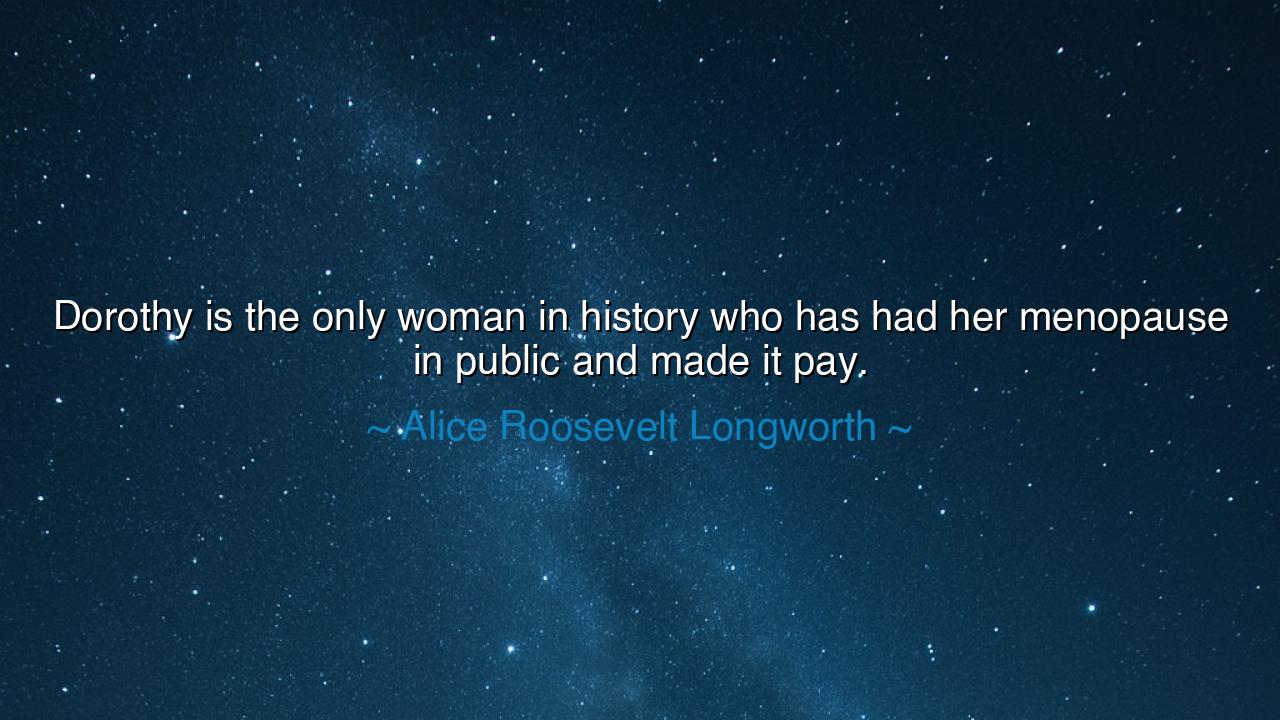
Dorothy is the only woman in history who has had her menopause in
Dorothy is the only woman in history who has had her menopause in public and made it pay.






The words of Alice Roosevelt Longworth, fierce daughter of a president and queen of Washington’s wit, echo with both mockery and admiration: “Dorothy is the only woman in history who has had her menopause in public and made it pay.” Beneath her sharp tongue lies a truth not only about Dorothy Parker, but about every soul who dares to turn pain into power, weakness into laughter, and loss into art. For in this remark, clothed in jest, lives a revelation — that even the natural decline of life, the change of seasons within the body, can become a triumph when faced with courage, honesty, and wit.
In the days of old, the bards would sing of heroes who faced dragons of steel and flame; but the truer hero is often the one who faces the dragons within — the despair of aging, the fading of youth, the turning of the heart from spring to autumn. Dorothy Parker, sharp-tongued poet and humorist, fought such dragons with her weapon of choice: her words. She did not hide her turmoil, nor veil her weariness behind false sweetness. Instead, she brought her anguish before the crowd, and they — seeing their own reflection in her wit — laughed, and in laughing, were healed. Thus, Longworth’s quip, though bathed in irony, acknowledges a deeper triumph: to suffer openly, yet master the suffering through art, is a nobility few achieve.
In the age of emperors and philosophers, the Stoics spoke of this wisdom. Seneca once said that what crushes the ordinary soul can strengthen the wise. So it was with Dorothy. When society mocked the aging woman, she made herself the mirror of its cruelty. She turned the world’s scorn into a jest so sharp that none could wield it against her again. It was her public menopause, not of flesh alone, but of spirit — the shedding of illusions, the cooling of passion, and the rise of a new, fierce wisdom that no youth could rival. What others saw as decline, she made her stage; what others feared, she made her profit.
Consider too the tale of Queen Hatshepsut of ancient Egypt, who, though born a woman, ruled as Pharaoh. When the priests whispered against her, saying she had outgrown her womanly station, she clothed herself in the symbols of kingship — the false beard, the crown, the regalia of men. Like Dorothy, she transformed society’s mockery into majesty. She turned what was called unnatural into divine purpose, and in so doing, made her change pay — not in coin, but in glory. Both women, though centuries apart, share this eternal truth: that the marks of time and struggle can be banners of victory, if borne with wit and will.
In this way, Longworth’s jest becomes a lesson for all who live under the weight of expectation. To age, to change, to be seen in one’s imperfection — these are trials that the world rarely forgives. But the wise do not beg for forgiveness. They stand, unhidden, before the crowd, and say: “This too is life. This too is worthy.” The hero’s heart beats not in the young alone, but in all who dare to claim their own story. And when that story is told truthfully — without disguise, without shame — it becomes an offering to all who follow.
Let no one think that Dorothy Parker’s humor was mere frivolity. It was a shield, a mirror, and a torch. Through laughter, she carved space for the honest woman to breathe in a world of pretense. Through her “public suffering,” she transformed humiliation into humanity. This is the secret of all great spirits: they do not escape the trials of life; they transmute them into something luminous.
Therefore, my children of the coming age, take heed of this teaching: when life strips you of your youth, your certainties, your illusions — do not hide in shadow. Stand as Dorothy stood, unmasked before the world, and speak your truth with the courage of laughter. Let your pain earn its place in the light; let your scars become your signature. For in every ending lies a new beginning — and if you are wise, you will make even that ending pay, not in gold, but in glory, in freedom, and in the peace of a heart unafraid to be seen.






AAdministratorAdministrator
Welcome, honored guests. Please leave a comment, we will respond soon